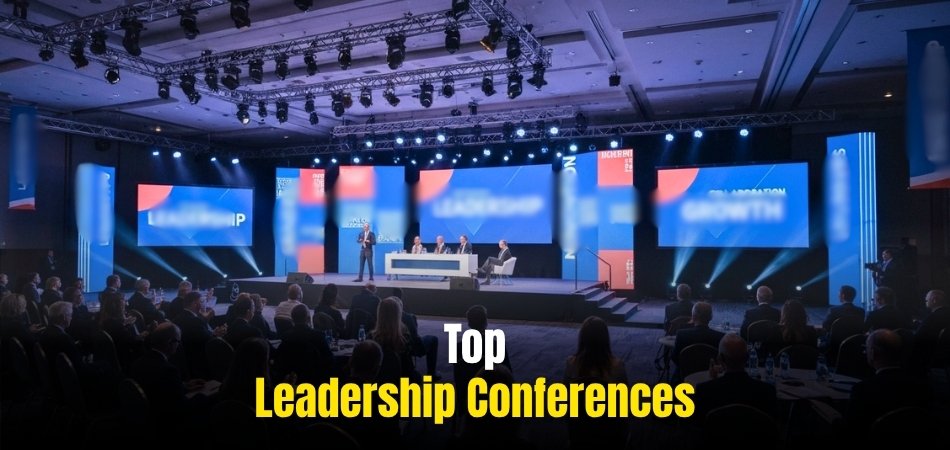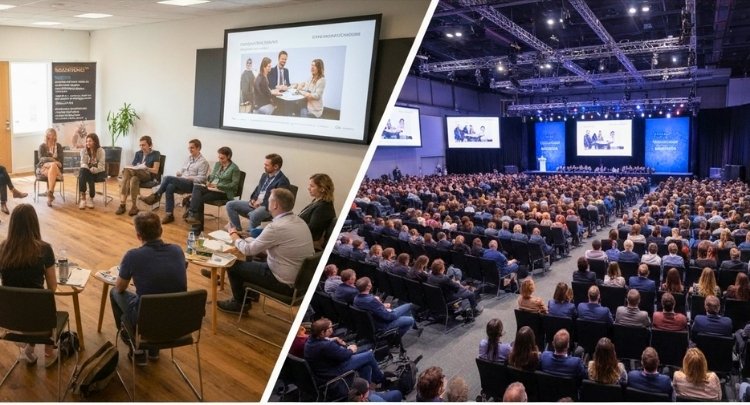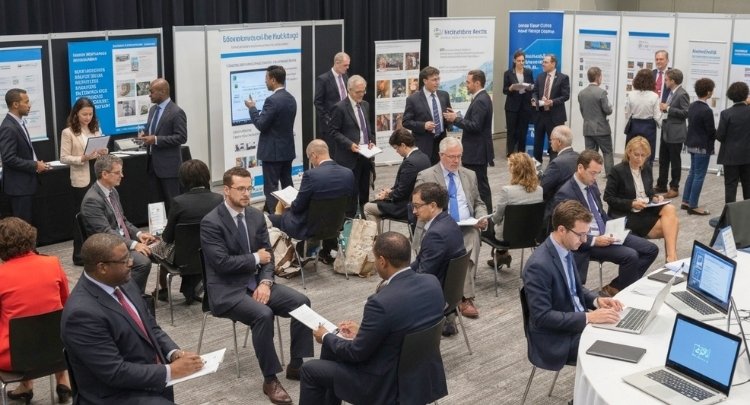These days leadership conferences are happening all over the world, bringing people together to learn and share ideas in exciting ways. People from different fields attend to hear experiences, discuss teamwork, and explore management strategies. If you are curious about events where leaders meet and exchange insights, you might be interested in these top leadership conferences.
Some of the key leadership conferences include the 45th Global Conference on Women in Business and Leadership, the International Conference on Leadership and Management, and the NIGP Leadership Summit. These events cover topics like change management, teamwork, entrepreneurship, healthcare leadership, and sustainability, providing a wide range of learning opportunities for attendees.
Are you curious about the topics, dates, and locations of these events around the world? Keep reading this article, and you will find all the necessary details about the most important leadership conferences happening soon.
Top Leadership Conferences
There are many leadership conferences around the world where people meet to share ideas and learn about leading teams. These events let you hear from different leaders and their experiences. They cover topics like management, teamwork, and handling change. Check the details below to see which conference interests you.
| Date | Conference Name | Location |
| December 12-14, 2025 | 45th Global Conference on Women in Business and Leadership (GCWBL) | Vancouver, Canada |
| December 3, 2025 | International Conference on Leadership and Management (ICLM) | Toronto, Canada |
| December 12-14, 2025 | 44th Global Conference on Leadership and Change Management (GCLCM) | Vancouver, Canada |
| December 31, 2025 | International Conference on Women Entrepreneurship and Leadership | Kumasi, Ghana |
| January 23-25, 2026 | 38th Global Conference on Front Line Leadership (GCFLL) | Honolulu, USA |
| January 28, 2026 | International Conference on Sustainability, Technology and Leadership | Kowloon City, Hong Kong |
| December 12-14, 2025 | 9th Global Conference on Healthcare Leadership and Management (GCHLM) | Vancouver, Canada |
| February 19–21, 2026 | NIGP Leadership Summit | Tucson, Arizona |
| July 14-16, 2026 | AESA Summer Leadership Conference | Riverside, CA, USA |
| February 1–3, 2026 | Foundation Leadership Forum | San Diego, California, USA |
45th Global Conference on Women in Business and Leadership (GCWBL)
- Date: December 12-14, 2025
- Location: Vancouver, Canada
Women leaders from various businesses attend this conference. Among the upcoming international conferences, this event focuses on making strong decisions in business and leading teams effectively. Attendees can hear inspiring stories and share their own experiences. It’s also a chance to meet professionals from around the world.
International Conference on Leadership and Management (ICLM)
- Date: December 3, 2025
- Location: Toronto, Canada
Leaders and managers gather here to learn about handling organizations better. There are discussions and workshops on teamwork, planning, and problem-solving. People can exchange ideas and hear real-life examples from different industries. This event helps attendees improve their leadership skills.
44th Global Conference on Leadership and Change Management (GCLCM)
- Date: December 12-14, 2025
- Location: Vancouver, Canada
The focus of this conference is on guiding teams during times of change. Participants learn how to handle uncertainty and lead organizations smoothly. Speakers share experiences and strategies that worked for them. It’s a great place to get practical tips for leadership challenges.
International Conference on Women Entrepreneurship and Leadership
- Date: December 31, 2025
- Location: Kumasi, Ghana
Women who run businesses or want to start one attend this event. It talks about business challenges, success stories, and leadership lessons. Attendees can meet other women leaders and build connections. The conference encourages sharing ideas and learning from one another.
38th Global Conference on Front Line Leadership (GCFLL)
- Date: January 23-25, 2026
- Location: Honolulu, USA
Front line leaders come here to improve how they manage teams. The conference shares tips for solving problems and making better decisions. People discuss practical ways to support their employees. It’s also a space to share personal experiences in leadership.
International Conference on Sustainability, Technology and Leadership
- Date: January 28, 2026
- Location: Kowloon City, Hong Kong
This conference explores leading organizations with modern technology and sustainable practices. Attendees learn how to balance business growth with environmental care. Speakers talk about new tools and ideas for effective leadership. It’s a chance to understand future trends in management.
9th Global Conference on Healthcare Leadership and Management (GCHLM)
- Date: December 12-14, 2025
- Location: Vancouver, Canada
Healthcare leaders gather here to discuss managing hospitals and clinics. The event shares ideas on improving patient care and handling challenges. Attendees can learn about new technology and practices in healthcare management. It’s also a place to connect with others in the field.
NIGP Leadership Summit
- Date: February 19–21, 2026
- Location: Tucson, Arizona
Organizations send leaders to this summit to strengthen teamwork and project management. Workshops focus on communication, problem-solving, and strategy. Attendees get a chance to share their experiences with peers. The summit also encourages networking with leaders from different sectors.
AESA Summer Leadership Conference
- Date: July 14-16, 2026
- Location: Riverside, CA, USA
This summer conference emphasizes learning leadership skills through activities and sessions. Participants explore ways to lead groups effectively. It also helps in understanding teamwork and collaboration. The event combines learning with opportunities to meet new people.
Foundation Leadership Forum
- Date: February 1–3, 2026
- Location: San Diego, California, USA
Leaders from various organizations attend this forum to exchange ideas and strategies. The focus is on improving decision-making and guiding teams. Attendees can hear real experiences from different industries. It’s a great opportunity to connect and get fresh perspectives.
What Can Attendees Expect From Leadership Conferences?
People gather at leadership conferences all over the world to gain knowledge about managing teams and organizations. Here, participants can hear from various leaders and gain fresh perspectives. They also learn useful skills quickly. Read below to see what usually happens at these events and what people gain.
Expert Talks
Experienced leaders give talks about their work and challenges at leadership conferences. They share tips on managing teams and solving problems. These talks often include real stories that everyone can relate to. Attendees get ideas they can use in their own work or projects.
Networking Opportunities
People meet others from different companies and industries. Networking helps in building new contacts and friendships. It’s a chance to talk to leaders and peers about common challenges. Many attendees leave with valuable connections for the future.
Skill Workshops
Workshops focus on improving practical skills like decision-making, teamwork, and communication. Participants often practice new methods in small groups. It’s an interactive way to learn instead of just listening. People often feel more confident after these sessions.
Panel Discussions
Panels include several experts discussing important topics together. Attendees can hear different opinions and approaches. Panels often end with a question-and-answer session. It helps people understand issues from multiple perspectives.
Leadership Lessons
Conferences show how leaders handle challenges in real situations. Attendees learn about strategies for managing change and difficult situations. They also get ideas on motivating and guiding teams. These lessons are helpful for improving leadership in any role.
Inspiration and Motivation
Many speakers share their personal stories of success and failure. This inspires attendees to work hard and keep improving. People often leave feeling motivated to take on new challenges. It also encourages thinking creatively about leadership.
Latest Trends
Conferences often discuss new trends in leadership and management. People learn about modern strategies, technologies, and approaches. This helps attendees stay updated and competitive in their field. It also gives ideas to improve their own work.
Interactive Sessions
Some sessions allow attendees to participate actively through exercises or games. These sessions help in understanding teamwork, problem-solving, and planning. People can practice skills in a safe environment. It makes learning fun and effective.
Small vs. Big Leadership Conferences: What’s the Difference?
Leadership conferences can be very different depending on their size. Some are small and personal, while others are large with many participants. Here’s a quick comparison to help understand the main differences between small and big conferences.
| Aspect | Small Leadership Conferences | Big Leadership Conferences |
| Number of Attendees | Usually fewer, 50-200 people, making it easier to interact | Can have hundreds or even thousands of participants, creating a bigger crowd |
| Networking | Personal and close connections with speakers and attendees | Wider networking but less personal interaction |
| Speaker Access | Easy to talk to speakers and ask questions | Limited time with speakers, often through Q&A sessions |
| Workshops | More hands-on and interactive | Often large sessions, less personal attention |
| Venue Size | Small venues or meeting rooms | Large halls or convention centers |
| Schedule | Flexible and easier to adjust | Fixed schedule with multiple tracks happening at once |
| Learning Style | Focus on discussion, participation, and practice | Focus on lectures, presentations, and large panels |
| Cost | Usually lower or moderate | Can be expensive due to scale and venue |
| Comfort | Less crowded, more relaxed atmosphere | Crowded, busy, and sometimes overwhelming |
| Follow-up | Easier to keep in touch with participants | Harder to maintain personal connections after the event |
What Type of Leaders Usually Attend Leadership Conferences?
Those who wish to enhance their ability to manage teams and organizations come together for leadership conferences. These events let attendees hear from experienced leaders and learn practical skills. Participants come from different backgrounds and roles. Read below to see the types of leaders who usually attend these conferences.
Business Leaders
Business leaders attend to learn strategies for running companies successfully. They often manage teams, make important decisions, and handle daily challenges. Conferences help them improve leadership skills and meet other professionals. They also share tips and stories from their experiences.
Team Managers
Team managers come to learn how to guide their groups better. They focus on communication, problem-solving, and motivating team members. Conferences provide workshops and discussions to help them handle challenges. They often leave with practical ideas to use immediately.
Entrepreneurs
Entrepreneurs attend to understand leadership in starting and growing businesses. They listen to experiences from other business owners and gain tips for managing teams. These events also help them think creatively and solve problems. Networking with peers can lead to new opportunities.
Healthcare Leaders
Leaders in hospitals, clinics, and health programs join to improve patient care and manage teams effectively. They discuss challenges in healthcare management and share solutions. Conferences offer sessions on new technologies and strategies. It helps them stay updated in a fast-changing field.
Educational Leaders
School principals, department heads, and academic managers attend to learn ways to lead their teams and institutions. They discuss teamwork, planning, and problem-solving in education. Conferences give ideas to improve leadership in schools and colleges. They also share experiences and best practices with others.
Nonprofit Leaders
Leaders of charities or nonprofit organizations attend to improve how they manage programs and teams. They learn about fundraising, communication, and motivating staff or volunteers. Conferences give them ideas to make their work more effective. Networking helps them connect with other nonprofit professionals.
Government Leaders
Officials and public service managers attend to improve leadership in government organizations. They discuss policies, team management, and problem-solving in public service. Conferences help them understand new strategies and challenges. They also exchange experiences with peers from different regions.
Technology Leaders
Leaders in tech companies attend to learn about modern tools, team management, and innovation. They explore ways to lead technical teams and projects successfully. Conferences provide insights into trends and best practices. Attendees also share solutions to common technology challenges.
Do Attendees Require Special Skills to Attend a Leadership Conference?
No, attendees do not need any special skills to join a leadership conference, as these events are open to all levels. Everyone, from beginners to experienced leaders, can participate and gain useful insights. The focus is on learning, sharing ideas, and improving leadership abilities.
People can attend without prior training because the sessions are designed to be easy to understand. Speakers explain concepts in simple ways that everyone can follow and practice. Workshops and discussions provide step-by-step guidance to help attendees apply the lessons in real situations.
Attending a leadership conference encourages listening, asking questions, and interacting with others in a friendly environment. Participants can observe how leaders handle challenges and learn from their experiences. By the end, attendees usually feel more confident, informed, and ready to lead teams effectively.
What to Do After Attending a Leadership Conference?
After attending a leadership conference, it’s important to think about what you learned and how it can help in real life. Conferences give lots of ideas, tips, and examples from different leaders. Taking time to reflect on these lessons can make them more useful. Read below to see practical ways to use what you learned.
Review Your Notes
Go through all the notes you took during sessions and workshops. Highlight the most important ideas and tips that stood out. This helps remember key points and makes it easier to apply them. Reviewing notes also prepares you to explain concepts to others.
Apply New Skills
Try using the new techniques or methods you learned in your daily work. Practicing skills soon after the conference makes learning stronger. Even small steps can make a big difference in how you lead. Keep checking how these changes work for your team.
Share With Team
Talk to your team about the ideas you learned. Share strategies that can improve teamwork and decision-making. Discussing lessons encourages others to try new approaches too. It also helps everyone stay motivated and engaged.
Stay in Touch
Keep in contact with people you met at the conference. Connect through email or professional networks. Staying in touch allows sharing ideas and opportunities later. These connections can be helpful for advice or collaboration.
Reflect on Goals
Think about your own leadership goals and how what you learned fits in. Decide what changes you want to make immediately. This keeps your progress clear and focused. Reflection helps set priorities for future growth.
Plan Next Steps
Make a list of actions to implement what you learned. Start with small, achievable steps that can create quick results. Planning keeps ideas from being forgotten or unused. It also helps track improvements over time.
Share Online
Post key takeaways on professional networks or blogs. It allows others to learn and shows your interest in leadership. Sharing online can spark discussions and new connections. It also reinforces your own understanding of the lessons.
Seek Feedback
Ask colleagues or mentors for feedback on new methods you try. This helps know what works and what needs adjustment. Feedback encourages continuous improvement in leadership. It also builds trust within your team.
Track Progress
Keep a record of improvements after applying new skills. Note what works well and what can be done better. Tracking shows growth and helps make informed decisions. It also motivates to keep learning and improving.
Attend Future Conferences
Look for more events to continue learning and meeting new leaders. Each conference can provide fresh ideas and new perspectives. Attending regularly keeps your skills updated. It also helps maintain professional connections over time.
Commonly Asked Question
Leadership conferences are held worldwide and attract a variety of professionals who want to improve their leadership skills. Many people are curious about how these events work, the benefits, and what makes them unique. Here are some frequently asked questions with detailed answers to give a clearer picture of these conferences.
How Can I Prepare Before a Leadership Conference?
Preparation includes researching the event schedule, understanding the topics, and noting speakers you want to meet. Preparing questions in advance helps you engage in discussions and workshops effectively. Reviewing your own leadership experiences also helps you connect ideas from the sessions to real situations.
What Should I Bring to a Leadership Conference?
Attendees should bring a notebook, pens, business cards, and any materials for workshops. Comfortable clothing suitable for long sessions is recommended. Digital devices like tablets or laptops can help take notes or connect online with peers during networking opportunities.
Are Leadership Conferences Only for Senior Managers?
No, leadership conferences welcome participants at all levels, including entry-level leaders, supervisors, and team coordinators. Events are designed to provide value to anyone interested in improving leadership skills. Sessions often include basic and advanced topics suitable for different experience levels.
How Can Networking Be Maximized at Conferences?
Maximizing networking requires active participation in sessions, discussion groups, and social events. Attendees should introduce themselves, ask questions, and exchange contact information. Following up after the conference strengthens connections and opens doors for collaboration or mentorship.
Do Conferences Include Hands-On Activities?
Many leadership conferences feature workshops, role-playing, and interactive exercises. These activities help participants practice skills like problem-solving, decision-making, and teamwork. Hands-on sessions make learning practical and allow attendees to apply strategies immediately.
Can I Attend Virtual Leadership Conferences?
Yes, many conferences offer virtual or hybrid options for remote participants. Virtual conferences provide access to live sessions, workshops, and networking through online platforms. They are ideal for those unable to travel while still offering valuable learning experiences.
How Are Speakers Selected for Conferences?
Speakers are often chosen for their experience, expertise, and leadership achievements. Organizers look for professionals who can share practical strategies and inspiring stories. Many are recognized leaders in business, healthcare, education, technology, or nonprofit sectors.
Are Leadership Conferences Useful for Career Growth?
Yes, attending conferences helps develop leadership skills, expands professional networks, and improves visibility in your field. The knowledge gained can lead to promotions, better team management, and enhanced problem-solving abilities. It provides practical strategies applicable in everyday work.
How Often Should One Attend Leadership Conferences?
Attendance depends on professional goals, budget, and relevance of the conference topics. Many leaders attend annually or every few years to stay updated on trends. Regular participation keeps skills fresh and provides continuous opportunities for networking and learning.
How Do Conferences Benefit Small Business Leaders?
Small business leaders gain strategies to manage teams, streamline operations, and handle challenges effectively. Conferences also provide ideas for marketing, customer relations, and leadership development. Networking can connect them with mentors, partners, or investors to support growth.
Final Thoughts
Attending leadership conferences can truly change the way you think about leading teams and handling challenges. They give you real-life examples, new skills, and ideas that you can use right away. Every session and discussion can spark inspiration for your own growth.
Meeting other leaders and sharing experiences helps build connections that last beyond the event. These relationships can open doors, create opportunities, and give support when facing difficult decisions. Learning from different industries and backgrounds makes your perspective broader and more practical.
If you want to stay updated, improve your skills, and meet influential professionals, exploring top leadership conferences is a great start. Following up on what you learn ensures that every event becomes a meaningful step in becoming a stronger, confident leader.









